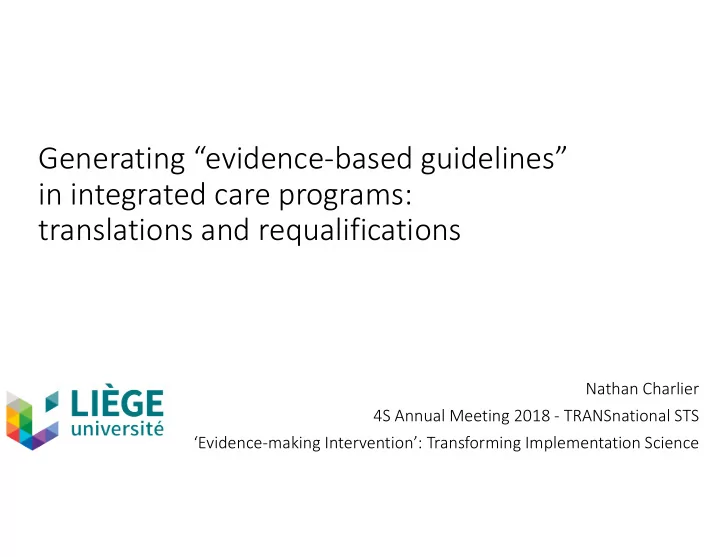

Generating “evidence-based guidelines” in integrated care programs: translations and requalifications Nathan Charlier 4S Annual Meeting 2018 - TRANSnational STS ‘Evidence-making Intervention’: Transforming Implementation Science
Who I am • From STS & policy analysis to Public Health • My privileged access to empirical observations: I am part of a team evaluating “integrated care pilot projects”
“Integrated care pilot projects”? • Policy program Integreo – Integrated care for better health 2015-2022 • Fragmented healthcare system vs. Multimobidities & chronic diseases “Integrated health services are health services that are managed and delivered in a way that ensures people receive a continuum of health promotion, disease prevention, diagnosis, treatment, disease management, rehabilitation and palliative care services, at the different levels and sites of care within the health system, and according to their needs throughout their life course.” (WHO global strategy on people-centred and integrated health services, 2015)
Whole System Change Integratedcare Current healthcaresystem Fragmented system Integration and continuity of care Reactive care Planned, proactive care Disease-oriented approach People-centred approach Medical model (professional silos) Multidisciplinary model
13 Integrated care pilot projects • Territorially defined • Timeframe: 4 years • Bottom-up approach: various professionals coming together to define an action plan to develop integrated care
Integrated care pilot projects 14 ‘components’ to guide pilot projects towards integrated care: Around the individual patient Around professionals At the loco-regional level 1. Patient empowerment 5. Prevention 11. Development of a quality culture 2. Support for informal caregivers 6. care coordination 12. Adaptation of the funding system 3. Case management 7. Care continuity 13. Risk stratification in specific populations 4. socio-professional reintegra�on 8. Valorisation of the experiences of 14. Change management pa�ent organiza�ons 9. Digitally integrated patient records 10. Multidisciplinary Guidelines
“Evidence-based” in integrated care pilot projects? Research questions & 1 st reflections • What room for this E-B approach? Conflicts with other integrated care components? • “Scientific evidences” mostly monodisciplinary vs. multimorbidities & multiple care professionals around a patient • To generate change in care practices, “evidences” have to go through multiple translations and decisions • What room is left for various forms of knowledge? Competition or cooperation?
However… • Integrated care pilot projects took a big delay: started in July • Pragmatically, today: sharing 1 st thoughts on how evidence based approaches are translated and implemented in the policy and in pilot projects’ action plans (document analysis + participant observation) • 3 levels: • Government vision • Pilot projects’ actions • Role of scientific evaluation
Practical fact sheet on “multidisciplinary guidelines” A ‘handbook’ for pilot projects, representing the government point of view: what to do, how, why “chronic care and the acute frequency of multimorbidities necessitate the involvement of different care providers, who should collaborate in an integrated way and based on existing scientific evidences […] Current guidelines are usually monodisciplinary, and almost only focused on one single pathology. It is necessary to elaborate multidisciplinary guidelines that take co-morbidities into account.”
Various concepts articulated together, from “sources” to “outputs”, based on their “level of practicability” -> in practice, what mediations, decisions and transformations from one step to another, toward the most practical “protocols”?
Hierarchy with different evidence levels: some forms of knowledge have more value then other to inform and change care practices • RCT & meta-analyses: knowledge based on statistical study of a specific (sub)population • What room for other forms of knowledge that can inform care practices? (user expertise, clinician experience, ethics, psychology, patient preferences…) • Integrated care practice: centred on individuals, or on aggregated populations?
Evidence-based guidelines within pilot projects • Not considered a primary component (e.g. compared to care coordination between professionals , or change management induced by the projects) • But still mentioned by every pilot project, though: • Developing “integrated care trajectories”, identifying & circulating “good practices” • Confusion: a method (to achieve integrated care) or a goal?
A method to develop pilot projects’ action plans • Little to no “multidisciplinary guidelines” for complex patients with multi- morbidities so far • Irrelevant and impossible to simply “combine” distinct RCT evidences about distinct pathologies/emanating from distinct research domains to generate such guidelines • How projects did: gathering different care professionals around the table, and discuss together • exchanges based on everyday work expertise and the confrontation of multiple points of view • references to scientific literature to justify actions: not a systematic process, but ad hoc, when it pops up in the discussion • Rather than “evidence-based” decision making: pragmatically tinkering “multi- knowledge based” decision making • Producing locally relevant knowledge shared among professionnals
Another layer of evidence making: the role of evaluators (i.e.: me) • Pilot project as a policy instrument: a mandate to produce evidences and policy recommendations about how integrated care works • Embedded research: not external independent evaluators but working hand in hand with the government and the pilot projects • Pilot projects = highly complex interventions changing health system -> impossible and useless to use RCT-like methods -> Rather generating multidisciplinary knowledge about the definition and implementation of integrated care in different contexts through comparison, collaborative hypothesis building and discussion
Thank you! ncharlier@uliege.be https://interfaithbel.blog/
Recommend
More recommend